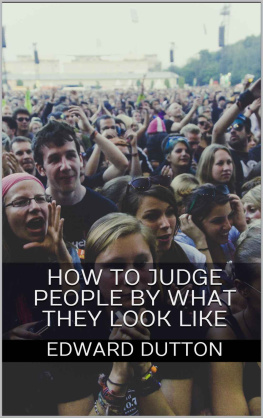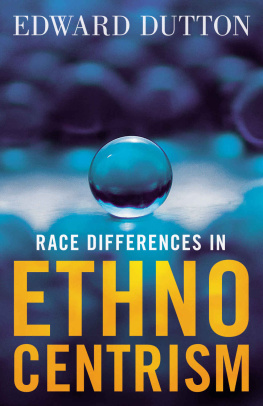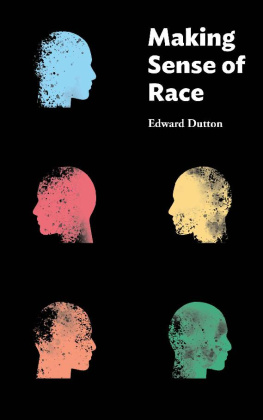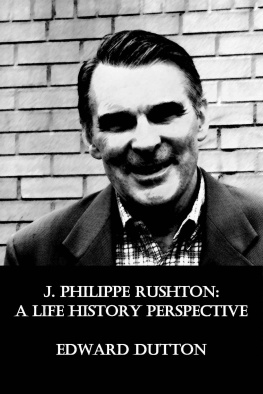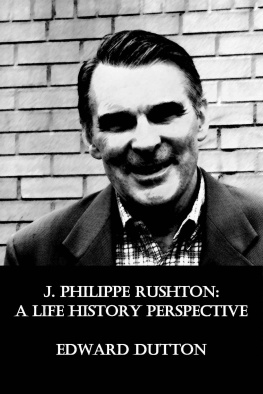Edward Dutton - How to Judge People by What They Look Like
Here you can read online Edward Dutton - How to Judge People by What They Look Like full text of the book (entire story) in english for free. Download pdf and epub, get meaning, cover and reviews about this ebook. year: 2018, publisher: Independently Published, genre: Romance novel. Description of the work, (preface) as well as reviews are available. Best literature library LitArk.com created for fans of good reading and offers a wide selection of genres:
Romance novel
Science fiction
Adventure
Detective
Science
History
Home and family
Prose
Art
Politics
Computer
Non-fiction
Religion
Business
Children
Humor
Choose a favorite category and find really read worthwhile books. Enjoy immersion in the world of imagination, feel the emotions of the characters or learn something new for yourself, make an fascinating discovery.
- Book:How to Judge People by What They Look Like
- Author:
- Publisher:Independently Published
- Genre:
- Year:2018
- Rating:5 / 5
- Favourites:Add to favourites
- Your mark:
- 100
- 1
- 2
- 3
- 4
- 5
How to Judge People by What They Look Like: summary, description and annotation
We offer to read an annotation, description, summary or preface (depends on what the author of the book "How to Judge People by What They Look Like" wrote himself). If you haven't found the necessary information about the book — write in the comments, we will try to find it.
How to Judge People by What They Look Like — read online for free the complete book (whole text) full work
Below is the text of the book, divided by pages. System saving the place of the last page read, allows you to conveniently read the book "How to Judge People by What They Look Like" online for free, without having to search again every time where you left off. Put a bookmark, and you can go to the page where you finished reading at any time.
Font size:
Interval:
Bookmark:
How to Judge People by What They Look Like
Edward Dutton
You cant judge people by what they look like! Its drummed into us as children and, as this book proves, it is utterly false. In this highly readable analysis of the academic research, Dutton shows that we are evolved to judge peoples psychology from what they look like, we can accurately work out peoples personality and intelligence from how they look, and (quite often) we have to if we want to survive. Body shape, hairiness, eye width, finger length, even how big a womans breasts are... Dutton shows that these, and much else, are windows into personality, intelligence, or both. Once you read How to Judge People by What They Look Like , youll never look at people the same again.
Table of Contents
About the Author
Acknowledgements
Foreword by Prof. Bruce Charlton
1. The Strange Death of Physiognomy
1. The Wisdom of the Ancients
2. Not by the colour of their skin...
3. Intelligence
4. Personality
5. Race and Physiognomy
6. Gender and Age
7. Beyond the Trickle Effect
2. Beach Body
1. Body Type and Personality
2. Fat and Thin Psychology
3. The Muscle Man and the Weakling
4. Testosterone and Intelligence
5. Skin and Hair
6. Breasts and Other Body Ornaments
7. Height
8. Tattoos
3. Talking Heads
1. Wide Boys
2. Your Eyes are Too Close Together
3. Baldness
4. Dont be Such a Bighead!
5. Not Much Behind the Eyes
6. Head Ornaments
7. Skin Quality
8. Head Wounds
9. Facial Symmetry
10. Sexuality
11. Ginger Hair
4. Cross My Palm With Silver
1. 2D:4D Ratio
2. Hairy Fingers and Hairy Chest
3. Left Handedness
4. Taking Things Further...
5. All in the Mind
1. Overgeneralization
2. Only the Kernel of a Model
3. Weak Correlations
4. What is the Direction of Causation?
5. Careful Now...
6. Clever Tricks
7. Conclusion
References
About the Author
Edward Dutton is a freelance researcher and writer. Born in London in 1980, he lives in Finland and is Adjunct Professor of the Anthropology of Religion at Oulu University. Dutton was educated at the Durham University, where he graduated in Theology in 2002, and the Aberdeen University, from which he received his PhD in Religious Studies in 2006.
Dutton has been guest researcher at Leiden University in the Netherlands and Ume University in Sweden, and has been academic consultant at King Saud University in Saudi Arabia. He has published widely in psychology in such journals as Intelligence, Personality and Individual Differences and Evolutionary Psychological Science. Duttons other books include: Meeting Jesus at University: Rites of Passage and Student Evangelicals (Routledge, 2016), Religion and Intelligence: An Evolutionary Analysis (Ulster Institute for Social Research, 2014) and The Genius Famine (University of Buckingham Press, 2015) (jointly with Bruce Charlton). Duttons research has been reported in newspapers worldwide. In his spare time, Dutton enjoys genealogy and has written many articles on the subject. He is married to a Finnish Lutheran priest and has two children. He can be found online at www.edwarddutton.wordpress.com
Acknowledgements
I would like to thank Prof. Dimitri Van der Linden, Prof. Guy Madison and Dr Bruce Charlton for their helpful comments on earlier drafts of this short book.
Foreword by Prof. Bruce Charlton
Appearances are not always deceptive. Indeed, quite the opposite. In this highly informative and entertaining mini-book, Dr Dutton surveys the psychological data in support of the neglected idea that we can tell a lot about someone from how they look. The fact that most people believe they can judge a stranger by their face and body makes it plausible that we really can do this, if not with total accuracy, then at least to a useful degree. It is a question of probabilities. So long as we are better than random at predicting traits such as personality, intelligence or aggression; overall this would have a positive impact on reproductive success. As social mammals, this attribute would have been very helpful, and sometimes vital, during our evolutionary history. Dr Duttons book is a necessary corrective to misleading modern myths and taboos about judgmentalism and stereotyping. As he makes clear; so long as we are prepared to modify our first impressions in the light of further evidence; it is reasonable and sensible to take seriously our innate ability to sum-up a stranger with a glance.
Prof. Bruce Charlton
Reader in Evolutionary Psychiatry at Newcastle University and Visiting Professor of Theoretical Medicine at the University of Buckingham.
Chapter One
The Strange Death of Physiognomy
People say sometimes that Beauty is only superficial. That may be so. But at least it is not so superficial as Thought. To me, Beauty is the wonder of wonders. It is only shallow people who do not judge by appearances. Oscar Wilde, The Picture of Dorian Gray.
Everyones heard the clich, Dont judge a book by its cover. Dont judge people by their appearance. Judge people, if you have to judge them at all, by whats in their hearts. Its a warm, cuddly idea: that nobody can help what they look like and what they look like is nothing to do with what they actually are like. Imploring people not to judge by appearances has many benefits: it makes you seem kind, for one, and it emphasises your profundity. You are somehow able to rise above your instincts, ignore the superficial, and plunge into the depths of peoples hearts.
In the 2001 comedy Shallow Hal, Jack Black plays Hal Larsen, who is obsessed with physical beauty. Hals superficiality appals the life success coach Tony Robbins (who plays himself). Robbins ends up sharing an elevator with Hal. Robbins hypnotises Hal such that he can only see peoples inner beauty. If theyre a good person then theyll be attractive; if theyre a nasty person then theyll look hideous. Accordingly, Hal ends-up dating an extremely kind but morbidly obese young woman, played by Gwyneth Paltrow. Unaccountably, from Hals perspective, chairs collapse under this slender goddess, she creates an enormous splash at the local swimming pool, and she has a bizarrely negative opinion of her own appearance. Most of us would like to think that we are like the hypnotized Hal and that we Dont judge a book by its cover.
1. The Wisdom of the Ancients
Except, we generally do. Despite gaining all the social benefits of claiming we dont judge by appearances we almost certainly do so, even if only unconsciously. And we do so because we are evolved to do so, and because doing so has worked up until now. Oscar Wilde (1854-1900) quipped, in The Picture of Dorian Gray, Only shallow people do not judge by appearances (Wilde, 2012). In Medieval and Early Modern England, it went without saying that you judged by appearances. Although the hypotheses which underpinned their thought-systems such as astrology were hopeless, our ancestors had it partly right when it came to what is called physiognomy. This is the attempt to judge a persons character from what they look like.
The Ancient Greeks were firm believers in physiognomy. Aristotle (384-322 BC) wrote in Prior Analytics that, It is possible to infer character from features (Aristotle, 1989) and many other Greek scholars took the same view. Michael Scot (1175-1232), a Scottish mathematician and a scholar at the court of the Holy Roman Emperor, wrote a learned thesis on the subject (Porter, 2005, p.122). In the late 14 th century work Canterbury Tales, the author, Geoffrey Chaucer (c.1343-1400), gives the Wife of Bath a gap in her front teeth to imply that she is highly sexual. The Reeve is of slim build, to suggest he is choleric (bad-tempered and irritable), while the Summoner is ugly, because hes an unpleasant person (see Hallissy, 1995). Physiognomy was taught as an academic subject at English universities, until it was outlawed by Henry VIII (r.1509-1547) for having become associated with fortune-telling (Porter, 2005, p.134).
Next pageFont size:
Interval:
Bookmark:
Similar books «How to Judge People by What They Look Like»
Look at similar books to How to Judge People by What They Look Like. We have selected literature similar in name and meaning in the hope of providing readers with more options to find new, interesting, not yet read works.
Discussion, reviews of the book How to Judge People by What They Look Like and just readers' own opinions. Leave your comments, write what you think about the work, its meaning or the main characters. Specify what exactly you liked and what you didn't like, and why you think so.

